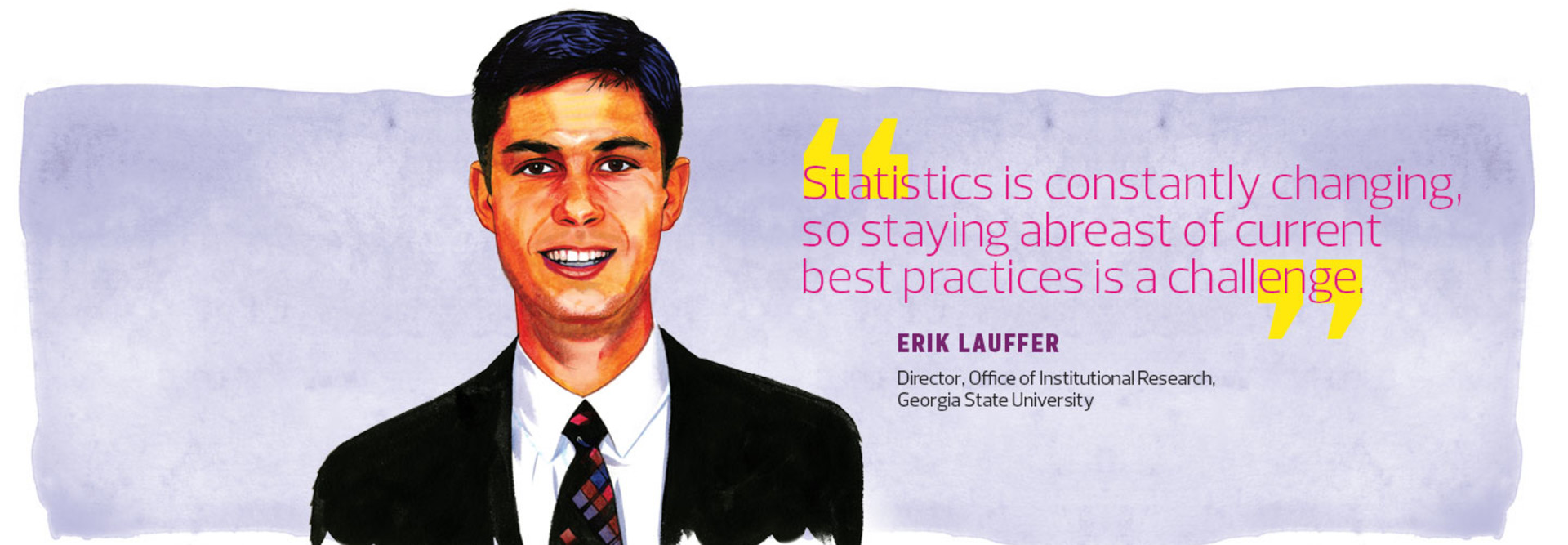The New Frontier: Erik Lauffer on the Importance of Data Accessibility
EDTECH: What is the state of analytics today in higher education?
ERIK LAUFFER: I think the upper administration at most schools is starting to be more data and intelligence hungry – and analytics can serve that role and proactively provide actionable data to decision makers. I define that as not just presidents and provosts. At Georgia State, we broaden that to include student, faculty and staff decision-makers.
EDTECH: What is the analytics strategy at your institution?
LAUFFER: We are using a third-party system called EAB [Education Advisory Board] that serves student enrollment services and advising groups. It’s an analytics system that looks at student outcomes and their performance early in their academic career. It allows our advisors to target at-risk students and have interventions.
For example, based on more than a decade of history, it can say, “You are not doing well in Accounting 1 and 2, which might mean you are not a good fit in the accounting major you are in. You’ve done really well in these other general education courses. You might consider a degree in this other major.” We try to figure out those paths for students, so they can efficiently change to a major they are more likely to be successful in.
Our administrators can also look at department-level and college-level metrics on student progression and success. Institutional Research is also doing analytics. One example is mapping out how efficiently we are using classroom space. We also provide self-service analytics tools on campus.
EDTECH: What are best practices for moving toward a data-driven decision-making model?
LAUFFER: For us, one of the big successes has been having an administration that truly desires the data and makes an effort to consume it and use it as much as possible. That’s key, to really have that data-driven decision-making expectation. When you see that at the top, you will start to notice middle managers wanting to follow the same practice because everyone wants to drive the same mission, values and vision of the university. A big part of that is to make the data accessible. We are always seeking new ways to present the data and make it as easy and as quick to access as possible.
We have IPORT, our web-based, self-service application that provides access to our student data warehouse. We have another reporting tool, Argos, that allows people in an office to see reports that are unique to their area, but the data is protected. It’s data that we don’t want to make publicly presentable because we do have to protect student records. While IPORT aggregates student data for a general audience, Arogos produces more lists and summaries that are of interest to a very specific audience.
Our aim is to guide users to those self-service tools. For ad hoc requests and unforeseen questions, the Office of Institutional Research is available on a case-by-case basis.
EDTECH: What are the challenges of implementing an analytics program?
LAUFFER: Statistics is a constantly changing world, so staying abreast of current best practices is a challenge. Technology is also constantly changing. Getting the data together and out to users in an effective way, so they can use it on a daily basis, is another issue.
At Georgia State, it’s an ongoing effort. We keep people abreast of what is available — informing people that IPORT exists, for example. Our decision support services team is constantly doing training to show users how to use the system.
EDTECH: From a technical perspective, what are the biggest hurdles to gathering and leveraging data from multiple systems?
LAUFFER: We have a data warehouse. The decision support services team is constantly adding tables and feeds to support new data that is available. We directly connect to systems and automatically pull data on a scheduled basis. It’s daily, weekly or monthly, depending on the data.
But data integration is an ongoing challenge. Some systems are proprietary, and the vendor will not allow direct connections. We work with vendors and try to achieve that. In some cases, they are willing to sell you that access, and if we deem it worthy, we will certainly pay to open it up. With others, they have export routines we can use as a workaround. But using export routines to generate a flat file is less effective. It’s not automated, so the data tends to not be updated as frequently.
EDTECH: How does an analytics expert complement other IT or strategic roles on campus?
LAUFFER: IT is an excellent resource for structuring the networks, servers and systems that need to be in place to make this all possible. But understanding the data and how the data are used is entirely a different area. Folks who work in Institutional Research, enrollment services and areas like that will understand the business practices and how data are being used, while IT tends to be one degree removed from that process.
At the Office of Institutional Research at Georgia State, we’ve got a broad enterprise view of the data. We have a good understanding of the data from a medium-to-high level, but not always the finer points. So it’s important for an Institutional Research shop to really build contacts with the offices that are working hands-on with the data, so you have knowledge of what’s going on in the trenches. That’s critical to ensuring good analytics because you need to understand what the data are and how they are being used in order to make sure you are extracting them appropriately and analyzing them correctly.
We work with the IT department and have a close working relationship with the database administrators who do development, and people with scriptwriting ability who can make changes to the data systems. So if we are making a blanket change to student data, someone from the IT side of the house will be writing those script-level changes. Institutional Research never changes data. We only analyze. Sometimes we can be useful in helping them understand the impact of a certain script.
EDTECH: What benefits have you achieved with analytics so far?
LAUFFER: One of the ways we’ve been successful in Institutional Research is integrating ourselves with the decision-making processes on campus. We are being invited to top-level discussions early on, so we can advise what kinds of data are available, so when hypotheses are thrown around, we can test those ahead of time.
Part of The New Frontier series of interviews with top data experts in higher education.









